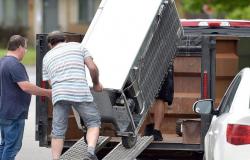The Katasa Group found itself in the spotlight at the start of the pandemic, when 47 seniors died in the private Herron residential and long-term care center (CHSLD). The Dorval establishment has since been sold.
The family business continues to operate four RPAs in Quebec – three in Gatineau and one in Pierrefonds, west of Montreal.
At the end of January, the Outaouais Integrated Health and Social Services Center (CISSSO) awarded a contract worth more than $70,000 to “support” its general management and the Katasa Group in the management of two Gatineau RPAs : the Residence and Château de l’Île, as well as the Riviera Village. The CISSSO claimed to be faced with an “emergency situation where the safety of people or property is in question”.
The CISSSO says it has intervened in recent years to improve things when shortcomings were detected. But “over time, it started again,” explains the organization’s deputy president and CEO, Benoît Major. Hence the decision to “take much more intense action”.
Mr. Major specifies that the problems did not come from the units where independent people live, but from the units where there are vulnerable users receiving more specialized care.
Complaints and reports
CISSSO data shows a total of 31 reports of mistreatment since 2022, i.e. 18 at the Résidence et Château de l’Île and 13 at Village Riviera. Between 2017 and 2023, no fewer than 250 complaints were recorded for these two RPAs.
Riviera Village, in Gatineau. (Étienne Morin/Le Droit)
“Certainly when you look at it on paper like that, it looks like a lot,” agrees Katasa Group partner Katherine Chowieri. She emphasizes, however, that the services offered by RPAs are “limited”, because more specialized care must be provided by the CISSSO.
In an interview, she explains that nursing care for bed sores and occupational therapy services, for example, are the responsibility of the CISSSO. In this context, she said, certain complaints may concern services to be offered by the public network and not by RPAs.
Katherine Chowieri is responsible for planning, new project design, marketing and finance at Katasa Group. (Étienne Morin/Le Droit)
Ms. Chowieri also notes that “the definition of abuse is very broad.” The CISSSO also confirmed to him that a “clearer” description was to come and that training would be put in place for RPAs. “We receive complaints, but is it really abuse or not? This is where it is not clear,” she laments.
The manager of the Katasa Group emphasizes that the support mandate was granted “to help both parties”. The deputy president and CEO of CISSSO, Benoît Major, ensures that there is “good collaboration” from Katasa. “The problem is not there,” he said. […] The people who work there, I don’t vilify them in public. […] We need to help them do their job.”
Unsatisfied loved ones
Ghyslaine Ladouceur says she noticed several shortcomings during her father’s brief stay at the Résidence de l’Île. Maurice Ladouceur moved there in mid-December 2023. The 86-year-old man suffers from dementia, but is still able to express himself.
For nearly three years, Ms. Ladouceur and her sister took turns caring for him, which ended up exhausting them. “The only place that was available urgently” was at the Résidence de l’Île, explains Ghyslaine Ladouceur. She trusted the system, but quickly became disillusioned.
Maurice Ladouceur left the Résidence de l’Île last February. “My sister arrived there and my father was lying in a little ball in his urine,” says Ms. Ladouceur. And its saturation [d’oxygène] was at 67%.”

Maurice Ladouceur with his daughter Ghyslaine, who says he noticed several gaps in the services at the Résidence de l’Île. (Ghyslaine Ladouceur)
The octogenarian was “non-coherent” and “not speaking.” His ostomy bag was overflowing with stool. Ghyslaine Ladouceur told her sister to call 911. Maurice Ladouceur, who was then infected with influenza, spent nearly a month in the hospital. There was no question for his family of him returning to the Résidence de l’Île.
While waiting for a place in a CHSLD in Gracefield, Maurice Ladouceur is at Résidence Martha in Gatineau. “If I could evaluate this house, I would give it a 110%, it’s wonderful,” emphasizes Ms. Ladouceur. […] My father sings, he plays games, he is stronger on his legs. It’s not the same person.”
Without knowing the details of this particular case, Katherine Chowieri assures that the attendants make rounds “regularly” to ensure that each resident is well.
Urgent inspection
Documents obtained by Les Coops de l’information through a request for access to information make it possible to lift the veil on the problems detected over the years in the care units of the Village Riviera and the Résidence et Château de l ‘Island.
After “several reports” of alleged mistreatment and recurring complaints, the big boss of the CISSSO requested “urgently”, last November, an inspection of the care units of the two RPAs, where the most vulnerable residents are located.
The CISSSO teams noted 19 cases of bed sores and that hygiene “left something to be desired” among certain residents.
“We also sent a lady to the hospital for investigation following a fall. Following these findings and other findings in previous weeks, a report of mistreatment was made to the complaints commissioner [du CISSSO].”
— Extract from a CISSSO report
At Katasa, Ms. Chowieri counters that the bed sore cases were raised by social workers who “are not trained to assess sores.” The company says it requested that a nurse evaluate each case and maintains that the CISSSO then confirmed that all the wounds were already “known” to the public network teams.
The CISSSO report written last fall specified that “residents are not in immediate danger currently, despite the presence of important issues to work on.”
“Unacceptable situations”
In December 2023, “three alleged reports of mistreatment” at the Residence and Château de l’Île were made to the complaints commissioner, Marion Carrière. In two cases, the files had to be investigated by a coroner, following deaths.
Last January, a “new situation of abuse” was reported. The CISSSO spoke of wounds, gaps in hygiene care and a “lack of collaboration on the part of RPA staff”.

The Résidence de l’Île, in Gatineau. (Étienne Morin/Le Droit)
A few days later, an official report for “organizational mistreatment” was made by the complaints commissioner. The latter recommended that the CISSSO “take the necessary means to stop the mistreatment of residents of the Résidence de l’Île” and to ensure that they “receive the required care and services”. The $71,600 contract to “support” the general management of CISSSO and the Katasa group was concluded a week later.
“We cannot accept that there are unacceptable situations that occur in our living environments, even if they are private,” insists Benoît Major.

Benoît Major is deputy president and CEO of the CISSSO. (Etienne Ranger, The Law)
As there is a shortage of hundreds of accommodation places in Outaouais, the CISSSO has realized that it must provide more support to RPAs welcoming “clients with severe needs”.
“Their mission is not to be a CHSLD, it is to be an RPA,” explains Mr. Major. […] We must help our residences more and better. […] There, we’re talking about Katasa, but what I’m saying is applicable for all our RPAs.”
Concerns for a long time
The documents obtained by the Coops de l’information reveal that the Outaouais RPAs of the Katasa Group were the subject of ministerial surveillance for years. One document speaks in particular of “problematic events” that occurred in 2017 and 2018. Another report indicates that “the operators would have taken the necessary means to restrict access to inspectors to certain places so that deficiencies are not noted”. The Katasa Group assures that its doors have always been “open” to representatives of the public network and that there have “never” been restrictions on their movement within RPAs.
Four coroners’ reports for deaths occurring between 2017 and 2022 also mentioned various deficiencies in the two RPAs concerned, including an “apparent lack of collaboration” from staff, incomplete notes and cases of malnutrition.
Ringing in the void
An inspection has already detected that around twenty call bells were non-compliant. “Sometimes residents mention that the response time is long,” it was stated in February 2022.
Two years later, the deadlines still seemed problematic. In January 2024, a document spoke of a Riviera Village resident saying he rang the bell after falling. “He had no response and […] It was a maintenance person who found him on the ground,” reads a report.
Katherine Chowieri says everything is now fixed for the call bells. “It is up to us and it has been corrected,” she assures.
Other shortcomings
The presence of mouse and cockroach droppings has also been raised over the years. One of the documents indicates that “despite the recurrent presence of vermin”, the operator “is taking the necessary measures”. “The exterminator comes every week to do inspections, […] so at the moment, everything is under control,” indicates the Katasa Group.
In several documents, there is also talk of other shortcomings such as “unclean” rooms, poor maintenance or even residents who claim that “the meals are cold”.
Ms. Chowieri notes that with RPAs running 24 hours a day, there can be some gaps in maintenance. “We cannot be perfect at all times, but we are always ready to correct ourselves,” she insists, specifying that CISSSO employees go to its RPAs every day.
“The situation has changed”
The CISSSO announced that each resident of the units concerned – around a hundred people in total – is now known and monitored by the public network’s home support teams. “The situation has changed,” assures Benoît Major.
Would the Deputy CEO of CISSSO be comfortable entrusting one of his loved ones to one of the two RPAs of the Katasa Group where so many problematic situations have been detected? “Today, with what I know of what we are putting in place, yes,” says Mr. Major. Would the answer have been the same six months ago? He simply repeats that at present, he would have no fears.
At Katasa, Katherine Chowieri believes that it would have been desirable for the CISSSO home support teams to establish follow-up more quickly for each resident living with a significant loss of autonomy.
The support mandate will continue for a few more weeks. Satisfied with the evolution of the situation and communications with the CISSSO since the arrival of the consultant, the Katasa Group even decided to hire her at the end of her mandate with the public network.
The CISSSO indicates that at present, 80 users of the two RPAs concerned are subject to “intensive monitoring measures at home while awaiting public accommodation”. “The instruction is that any user with CHSLD level needs cannot be referred to these RPAs,” specifies the CISSSO.










